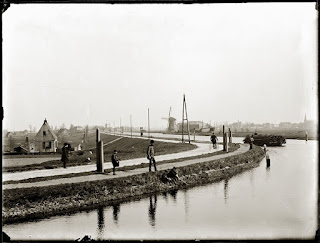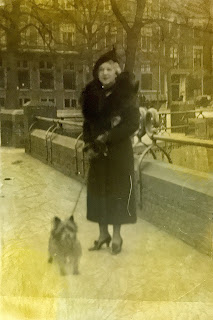Taxes
Week 15 prompt is about taxes.
Apparently my grandfather Cornelis (Kees) Blomberg liked to remind his children that taxes, like death could not be avoided, they were a fact of life; what mattered was what you were left with. I reckon that is a good enough reason to write about him in this post. In his later years he was also taxed by the ravages of Parkinsons disease.
I would have been about three years old when I first met him, but I don't remember of course. My grandmother told me that when we stayed with them in Amsterdam, and my parents were away catching up with family while back on leave from overseas, my little brother and I liked to climb up on the big windows overlooking the street from their apartment. My grandfather, Opa, would be sitting at his desk, listening to his radio tuned to his favourite program and would call out to us "turun", Malay for "come down". We didn't understand Malay, so we probably ignored him, and then Oma would rush in and shoo us away.
This is his message, dated Amsterdam, 21 June '60:
But more about Opa Blomberg is revealed when I read through the notes in the family tree. I found that he was a member of het Gebroken Geweertje (the Broken Gun), De Blauwe Knoop (The Blue Button) and the Esperanto Bond. So he was a pacifist and conscientious objector, prohibitionist and supported one world language - Esperanto.
Cornelis Blomberg received his Diploma in Pharmacy on 11 June 1913, from the University of Amsterdam and five years later he gained his PhD in pharmacy, cum laude.
From 1922 to 1946 he lived and worked in the Dutch East Indies. On 4 September 1923, in Surabaya, he married Berendina Elisabeth Lawerman, whom he'd met while still living in Amsterdam.
Until 1927 he worked for Helmig Pharmacies in Surabaya and Batavia (now Djakarta) filling in for personnel that had gone on leave, but in 1927 he took on the position of pharmacist for the army. In 1932 he was appointed to the public service as Inspector Pharmaceutical Services for the Public Health Service.
On 11 June 1938 he celebrated his Silver Jubilee - 25 years as Apotheker and for this occasion was presented with a vase of Djokja Silver, Indonesian silver craft that was popular in the Dutch East Indies.
The local newspaper (Batavies Nieuwsblad) reported it as a festive celebration held at his home in Batavia with hundreds of guests from the public service and pharmaceutical and medical industry as well as many friends attending and ninety floral tributes attesting to his popularity.
When Japan occupied the Dutch East Indies in March 1942 he was briefly imprisoned but let out again, because he provided an essential service. My grandparents set up a course at their home that enabled many Indonesians to later pursue a career in pharmacy. However, near the end of the war the Japanese decided that all civilians should be classed as prisoners of war and so my grandparents were imprisoned again.
After the family returned to Holland in 1946, Kees Blomberg worked as lecturer in chemistry and physics, firstly in Bussum and then at Zaans Lyceum in Zaandam until 1951. Then his illness took hold and he had to retire. He passed away 2nd Feb 1963 in Amsterdam.
Apparently my grandfather Cornelis (Kees) Blomberg liked to remind his children that taxes, like death could not be avoided, they were a fact of life; what mattered was what you were left with. I reckon that is a good enough reason to write about him in this post. In his later years he was also taxed by the ravages of Parkinsons disease.
I would have been about three years old when I first met him, but I don't remember of course. My grandmother told me that when we stayed with them in Amsterdam, and my parents were away catching up with family while back on leave from overseas, my little brother and I liked to climb up on the big windows overlooking the street from their apartment. My grandfather, Opa, would be sitting at his desk, listening to his radio tuned to his favourite program and would call out to us "turun", Malay for "come down". We didn't understand Malay, so we probably ignored him, and then Oma would rush in and shoo us away.
 |
| Opa's radio was very much like this one. |
His radio was the old type, before transistor radios. I think it was a Philips, very much like the one pictured. It had to warm up for a bit before you got any sound. He had marked his favourite stations with bits of paper stuck on. It was his life line really, because Parkinsons had already limited his world.
Another memory I have is what he wrote in my Poesie Album - autograph album. It was the custom at the time to ask friends and family members to write in your album.
This is his message, dated Amsterdam, 21 June '60:
Een zeehond lag aan het strand, en poetste zijn gebit met zand.
O, moge je hart steeds zo rein als de tanden van die zeehond zijn.
Ter herinnering aan je Opa
geschreven door Oma, gedicteerd door Opa
A seal lay on the beach and brushed his teeth with sand.
O, may your heart be ever so pure as the teeth of that seal.
To remember your Opa.
Written by Oma, dictated by Opa
He had signed "je Opa" in shaky writing. Oma told me that he liked to quote this quirky little message when asked to write in someone's poesie album.
But more about Opa Blomberg is revealed when I read through the notes in the family tree. I found that he was a member of het Gebroken Geweertje (the Broken Gun), De Blauwe Knoop (The Blue Button) and the Esperanto Bond. So he was a pacifist and conscientious objector, prohibitionist and supported one world language - Esperanto.
Cornelis Blomberg received his Diploma in Pharmacy on 11 June 1913, from the University of Amsterdam and five years later he gained his PhD in pharmacy, cum laude.
From 1922 to 1946 he lived and worked in the Dutch East Indies. On 4 September 1923, in Surabaya, he married Berendina Elisabeth Lawerman, whom he'd met while still living in Amsterdam.
Until 1927 he worked for Helmig Pharmacies in Surabaya and Batavia (now Djakarta) filling in for personnel that had gone on leave, but in 1927 he took on the position of pharmacist for the army. In 1932 he was appointed to the public service as Inspector Pharmaceutical Services for the Public Health Service.
 |
| Silver Jubilee Apotheker 1913-1938 |
The local newspaper (Batavies Nieuwsblad) reported it as a festive celebration held at his home in Batavia with hundreds of guests from the public service and pharmaceutical and medical industry as well as many friends attending and ninety floral tributes attesting to his popularity.
When Japan occupied the Dutch East Indies in March 1942 he was briefly imprisoned but let out again, because he provided an essential service. My grandparents set up a course at their home that enabled many Indonesians to later pursue a career in pharmacy. However, near the end of the war the Japanese decided that all civilians should be classed as prisoners of war and so my grandparents were imprisoned again.
After the family returned to Holland in 1946, Kees Blomberg worked as lecturer in chemistry and physics, firstly in Bussum and then at Zaans Lyceum in Zaandam until 1951. Then his illness took hold and he had to retire. He passed away 2nd Feb 1963 in Amsterdam.





Comments
Post a Comment